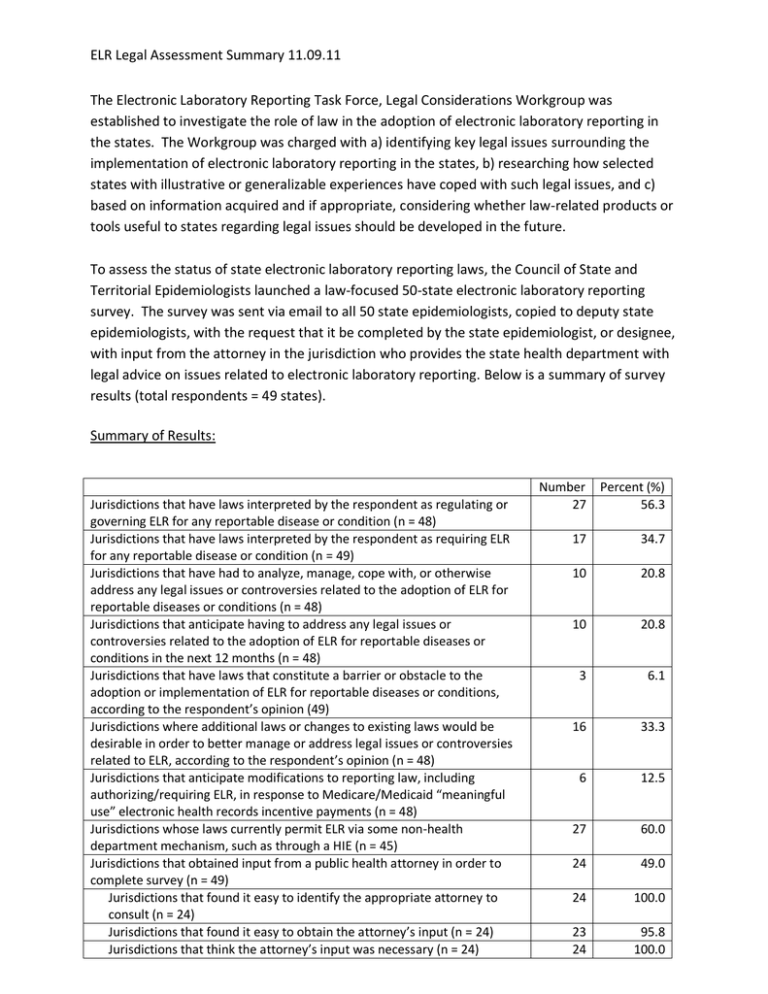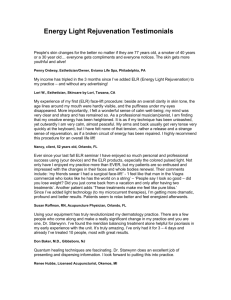ELR Legal Assessment Summary 11.09.11
advertisement

ELR Legal Assessment Summary 11.09.11 The Electronic Laboratory Reporting Task Force, Legal Considerations Workgroup was established to investigate the role of law in the adoption of electronic laboratory reporting in the states. The Workgroup was charged with a) identifying key legal issues surrounding the implementation of electronic laboratory reporting in the states, b) researching how selected states with illustrative or generalizable experiences have coped with such legal issues, and c) based on information acquired and if appropriate, considering whether law-related products or tools useful to states regarding legal issues should be developed in the future. To assess the status of state electronic laboratory reporting laws, the Council of State and Territorial Epidemiologists launched a law‐focused 50‐state electronic laboratory reporting survey. The survey was sent via email to all 50 state epidemiologists, copied to deputy state epidemiologists, with the request that it be completed by the state epidemiologist, or designee, with input from the attorney in the jurisdiction who provides the state health department with legal advice on issues related to electronic laboratory reporting. Below is a summary of survey results (total respondents = 49 states). Summary of Results: Jurisdictions that have laws interpreted by the respondent as regulating or governing ELR for any reportable disease or condition (n = 48) Jurisdictions that have laws interpreted by the respondent as requiring ELR for any reportable disease or condition (n = 49) Jurisdictions that have had to analyze, manage, cope with, or otherwise address any legal issues or controversies related to the adoption of ELR for reportable diseases or conditions (n = 48) Jurisdictions that anticipate having to address any legal issues or controversies related to the adoption of ELR for reportable diseases or conditions in the next 12 months (n = 48) Jurisdictions that have laws that constitute a barrier or obstacle to the adoption or implementation of ELR for reportable diseases or conditions, according to the respondent’s opinion (49) Jurisdictions where additional laws or changes to existing laws would be desirable in order to better manage or address legal issues or controversies related to ELR, according to the respondent’s opinion (n = 48) Jurisdictions that anticipate modifications to reporting law, including authorizing/requiring ELR, in response to Medicare/Medicaid “meaningful use” electronic health records incentive payments (n = 48) Jurisdictions whose laws currently permit ELR via some non-health department mechanism, such as through a HIE (n = 45) Jurisdictions that obtained input from a public health attorney in order to complete survey (n = 49) Jurisdictions that found it easy to identify the appropriate attorney to consult (n = 24) Jurisdictions that found it easy to obtain the attorney’s input (n = 24) Jurisdictions that think the attorney’s input was necessary (n = 24) Number Percent (%) 27 56.3 17 34.7 10 20.8 10 20.8 3 6.1 16 33.3 6 12.5 27 60.0 24 49.0 24 100.0 23 24 95.8 100.0 ELR Legal Assessment Summary 11.09.11 In addition to the CTSE survey, the Workgroup researched and reviewed all 50 state statutes and regulations related to electronic laboratory reporting. This research was done using an online legal research database. Nine states were then selected for in‐depth legal research. States in various stages were selected to achieve a diverse range of states with laws requiring ELR, states with laws permitting ELR and states with laws that currently do not allow ELR of any reportable diseases or conditions. Particular attention was paid to states reporting that they have faced or anticipate facing legal issues or controversies surrounding the implementation ELR. Attention was also paid to states in the early stages of ELR that reported interest in learning about other jurisdictions’ proven practices. Preliminary findings suggest vast heterogeneity among state public health surveillance laws. All states have laws that mandate reporting, but variability exists regarding diseases and conditions to be reported, reporting mechanisms, time‐frames for reporting, persons required to report and agencies to receive reports. Preliminary findings also show that the legal authority regarding ELR requirements varies from state‐to‐state. In certain states this authority is enumerated in statutory provisions; in others, the legal authority is delegated to state and local departments of health to promulgate rules and regulations; and still other states require reporting both under statutes and health department rules and regulations, but delegate authority to the Commissioner to publish a list of diseases and conditions to be reported as well as the time‐frame and mechanism for reporting. The Legal Considerations for ELR Workgroup is still in the process of interviewing state epidemiologists and public health attorneys. A final report is forthcoming.

